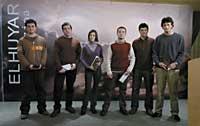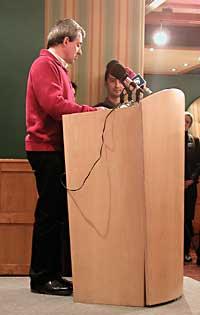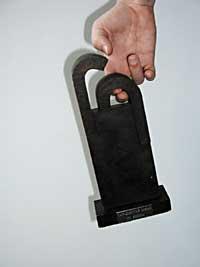Awards are in full maturity
2005/04/01 Rementeria Argote, Nagore - Elhuyar Zientziaren Komunikazioa Iturria: Elhuyar aldizkaria

The present edition of the CAF-Elhuyar Awards has been awarded with the work entitled ‘Gure alde basatian barna’. The author of this article is biologist Begoña Arrate. The article undoubtedly bears an attractive title, and the topic dealt with is like this: reproduction. Somehow, it explains the similarities and peculiarities of the different types of animals in reproductive terms.
The members of the jury valued that the theme is “interesting and innovative in its presentation”. In fact, the structure of the article is not usual, it is not linear: it has presented the main text as a journey of several branches that the reader can complete as desired.
The article has received many flowers in the award delivery: “The theme attracts you from the first moment. No wonder, as this work shows what one of the most important internal forces of our behavior is based on and how it moves us.”

The second prize went to a trio of biologists: Jokin Lapaza, Manuel Mendez and Eneko Salaberria. The article is entitled ‘Beetles, forest correspondents’ and, as its name suggests, is based on beetle, saproxylic beetles that serve as an indicator of the state of the forest. These beetles need dead wood, so they are used to quantify dead or diseased wood. According to the jury, “apart from the current situation, we must highlight the quality of scientific content and the simple and understandable style of writing”.
The third prize went to Ibon Odriozola and the article was for What molecular smells! The jury, among other things, noted: “the article is well written, it is didactic and allows us to learn more about this mysterious meaning”. In addition, he stressed that smell is “the most enigmatic of the senses, with the 2004 Nobel Prize being the first to be awarded to this sense for his research on smell receptors and the construction of the smelling system to Axel and Buck. In this article, the author looks at the attractive and disgusting sensations produced by molecules based on their chemical content.”
And as every year, a special prize was awarded to writers under the age of 25. Many young writers presented their work to the awards, among which the jury has valued the work “The hole of the ozone layer”. The author of this work is Mikel Gorrotxategi, engineering student. This young man explains in his article eleven issues related to the ozone layer. As the jury has pointed out, “this young writer has written a beautiful article full of news. He has succeeded in choosing the theme and has written a modern, attractive and colorful article.”
Artisans of Outreach

“Nobody teaches this work and, in view of the place it occupies in the media, it is time to turn it into a discipline of our universities and centers. For when, therefore, the dissemination of science, specialized studies to train professionals who expose science in lowercase to society? As long as these degrees are not implemented, the articles of scientific dissemination are the work of artisans. With the charm of craftsmanship.”
With this demand, Koldo Nuñez, on behalf of the members of the jury, began the presentation of the CAF-Elhuyar awards. This year's edition was the XI and 25 papers were presented, all of them of good level, which show that the scientific dissemination in Basque is very strong. Among other things, the members of the jury have highlighted the good quality of the work, and they wanted to especially thank the effort to bring the research carried out in Euskal Herria to the public level, since this call has intensified the articles that have wanted to disseminate the research carried out in the Basque Country itself. In addition, the papers presented have covered most fields of science: physics, chemistry, biology, computer science, philosophy, medicine... And it must be said that this year the number of articles of social sciences has increased. Next year more.



